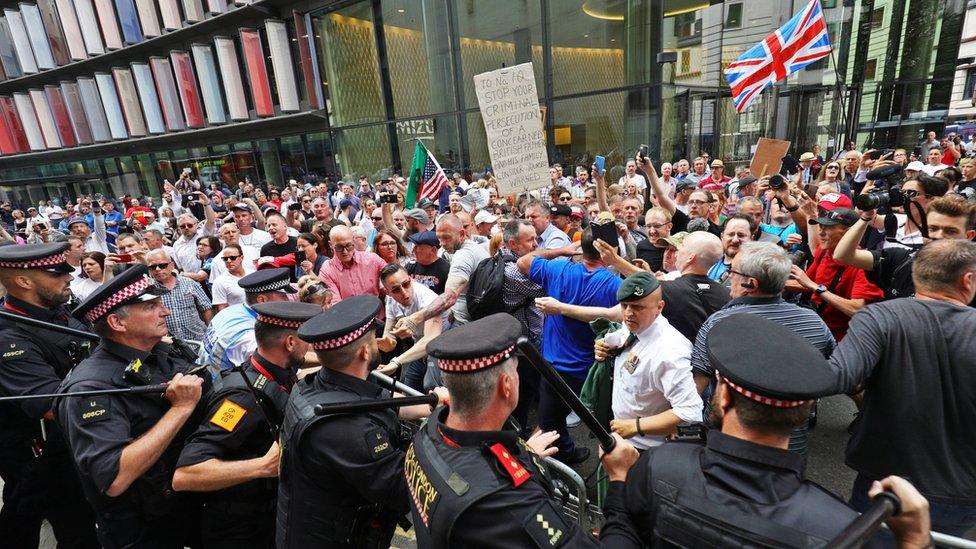Tommy Robinson guilty over Facebook broadcast
- Published

Tommy Robinson leaves court after being found guilty
Ex-English Defence League leader Tommy Robinson has been found in contempt of court for his Facebook Live broadcast of defendants in a criminal trial.
He was found guilty of interfering with the trial of a sexual grooming gang at Leeds Crown Court in May 2018.
Two High Court judges found his conduct "amounted to a serious interference with the administration of justice".
The court ruled that the 36-year-old, from Luton, committed contempt by breaking reporting restrictions.
Robinson, whose real name is Stephen Yaxley-Lennon, had denied any wrongdoing, saying he had only referred to information that was already in the public domain.
Following the verdict at the Old Bailey, he told the BBC he had been convicted "for who I am, not what I have done".

Supporters gathered outside the Old Bailey after the verdict

Tommy Robinson told the crowd he thought the decision was wrong
One of the senior judges, Dame Victoria Sharp, said the court will consider what penalty to impose for the contempt - which carries a maximum penalty of two years - and give full reasons for the decision at a later date.
She said Robinson breached the reporting restriction imposed on the trial by live-streaming a video from outside the public entrance to the court and by "aggressively confronting and filming" some of the defendants.
The judge said the content of the video "gave rise to a substantial risk that the course of justice in that case would be seriously impeded" and the confrontation of the defendants was a direct interference with the course of justice.

What is contempt of court?

Contempt of court laws exist to ensure people get fair trials. The idea is that juries must not be influenced by anything but the evidence they hear in court.
The rules apply to everyone from journalists to people posting comments on social media, and even jurors.
If someone interferes with a trial, the defendants can walk free and a new trial may have to be held.
The maximum sentence for contempt of court is two years in prison, but it can also be punished with an unlimited fine.
Contempt includes publishing anything that creates a substantial risk of seriously prejudicing "active" criminal proceedings. Proceedings become "active" when a suspect is arrested.
Someone could also be in contempt by actions including taking photographs or film, recording what is said in court or talking to a jury member about a case.

Reporting restrictions had been put in place postponing the publication of any details of the 2018 case at Leeds Crown Court until the end of a series of linked trials involving 29 defendants.
Robinson broadcast the footage from outside the court on 25 May 2018, while the jury in the second trial of the series was considering its verdict.
The video lasted an hour-and-a-half and was viewed online 250,000 times after being live-streamed on Facebook.
Allow X content?
This article contains content provided by X. We ask for your permission before anything is loaded, as they may be using cookies and other technologies. You may want to read X’s cookie policy, external and privacy policy, external before accepting. To view this content choose ‘accept and continue’.

He was originally jailed for 13 months on the day of the broadcast but was released two months into his sentence after winning an appeal.
The case was then referred back to Attorney General Geoffrey Cox, who announced in March that it was in the public interest to bring fresh proceedings.
Speaking after the latest verdict, Mr Cox said the court's decision reflected the seriousness of posting online material which risks prejudicing legal proceedings.
"I would urge everyone to think carefully about whether their social media posts could amount to contempt of court," he added.
A provisional date of 11 July was given for Robinson's sentencing hearing.
- Published11 July 2019
